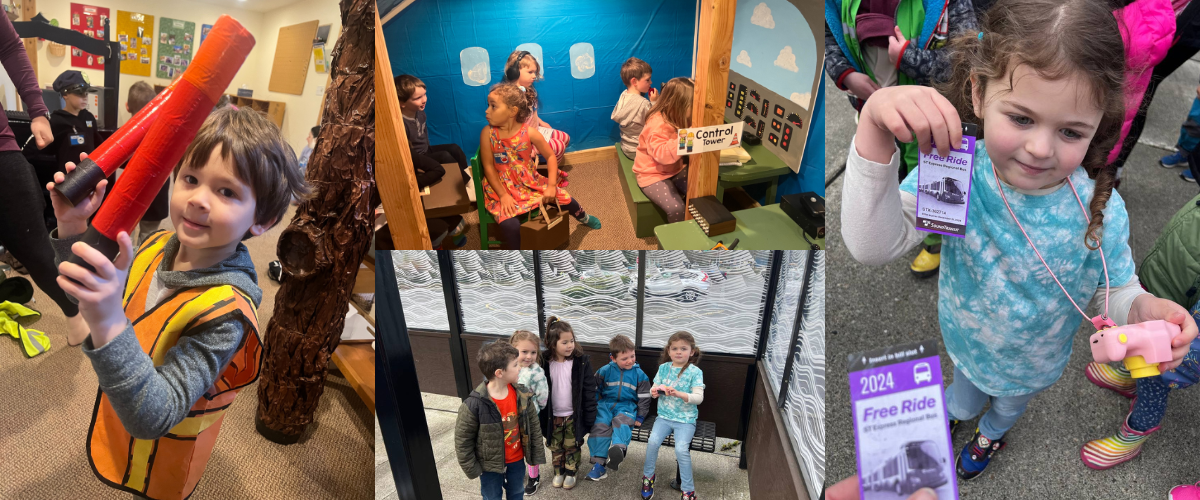- 408-924-7560
- mineta-institute@sjsu.edu
- Donate
Pre-Kindergarten Curriculum

What do you want to be when you grow up?
This transportation-focused curriculum incorporates early literacy and STEAM concepts into developmentally appropriate child-led imaginative play, open-ended hands-on activities, and engaging field trips to empower children to learn about transportation. Through these activities, children begin to understand that buses and trains aren’t just vehicles—they're lifelines that bring people together, support local economies, and help create a more equitable and sustainable world.
The activities on this webpage align with the California Preschool/Transitional Kindergarten Learning Foundations—a framework for educators to support the development of young children in various domains to ensure they are prepared for kindergarten and beyond. They are also led by the principle that play is the work of childhood.
How to Use:
This curriculum is designed to be implemented holistically and therefore all activities empower children to develop skills across multiple areas. The activities are listed by type for the ease of the educator for curriculum planning and classroom management. The thematic calendar is divided into classroom sections that loosely align with the categories. No matter how they are organized, the activities found on this webpage help children absorb the foundational concepts and skills that will help them be successful in the classroom, in their community, and in life.
Age Group: 4-5 years old (Pre-K or TK-level)
This learning tool was created in partnership with the Bothell Family Cooperative Preschool.
| Pre-Kindergarten Curriculum Activities | |
|---|---|
|
Access curriculum activities on Google Docs.
|
|
|
California Preschool/Transitional Kindergarten Learning Foundations Social Emotional Development: self-identity, confidence in abilities, understanding emotions in self and others, managing routines and transitions, awareness of similarities and differences, empathy, emotional regulation Foundational Language Development: understanding and using words for categories, understanding and using size and location words, constructing narratives, sharing opinions, asking questions, understanding the concept of print, dictating thoughts and ideas to be conveyed in writing, recognizing letters, writing own name, understanding directions, participating in conversations Mathematics: reciting numbers, one-to-one correspondence, cardinality, numeral recognition, number comparison, number operations, solving addition and subtraction in everyday situations, sorting and classifying, recognizing and using patterns, ordering objects, identifying two-dimensional shapes, composing shapes Science: making observations, comparing and contrasting, asking questions, defining problems, making predictions, using tools, characteristics of objects, light and sound, living and nonliving things, needs of living things, weather, earth and human activity, engineering design and society Physical Development: balancing while still and in motion, walking with balance, running, jumping, fine motor skills, hand preference, spatial awareness, directional thinking, physical activity, cardiovascular endurance, strength and flexibility Health: identifying and naming body parts, communicating about health needs, recognizing and communicating about body boundaries, following safety rules, following emergency routines, following transportation and pedestrian safety rules History and Social Science: making observations and asking questions, gathering information, membership in communities, exploring cultural communities, exploring similarities and differences, identifying and including peers, offering help, group decision making, collective problem solving, understanding of time, describing change over time, communicating locations and directions, caring for the world, community needs, awareness of people at work Arts: attending to and engaging in visual arts, communicating about art forms and elements, drawing lines and curves, mixing and blending colors, practice fine motor skills, attending to and engaging in music, responding to music with body movements, exploring vocal expression and instruments, exploring beat and rhythm awareness, engaging in drama, understanding plot, engaging in role-play, vocal projection, using props or costumes, engaging in dance, improvising dance, communicating through dance |
| Lesson Plan Thematic Calendar Template | Lesson Plan Thematic Calendar Example |
|---|---|
|
|
|
|
Access thematic calendar template on Google Docs. |
Access thematic calendar sample on Google Docs. |
-
Contact Us
San José State University One Washington Square, San Jose, CA 95192 Phone: 408-924-7560 Email: mineta-institute@sjsu.edu





